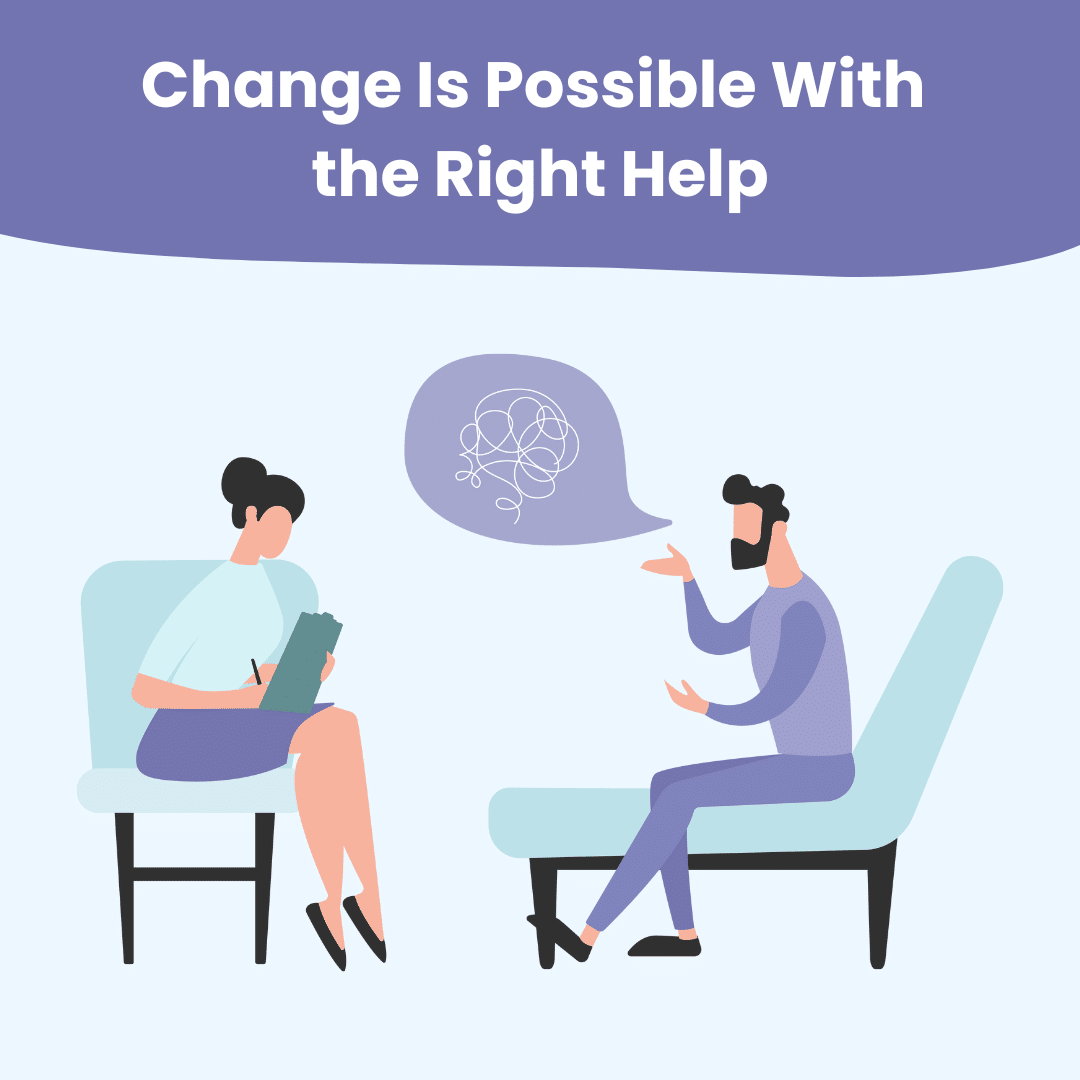
- Published on 27 May 2025
Let’s be real: mental health or therapy is not a comfortable topic for most men. From a young age, boys are taught to ‘toughen up’, ‘Be a man’ or Don’t cry.’
Have these lessons benefited any man, really?
Today, 6 million men suffer from depression every year. Over 40% of them won’t talk to anyone about it.
Why? Because men are taught to run away from concepts like vulnerability, openness, and emotional expressions – all that makes us human.
If you’re a man reading this, there is one thing that can help you reclaim your true self from the society that denied you of it: therapy.
In this article, read seven of the most compelling reasons you may benefit from professional support (and how therapy displays your strength and willingness to actually ‘be a man’).
Mental Health Support for Men
The societal pressure on men to be strong and never rely on anyone is unrealistic at best and psychologically distressing at worst.
Many men struggle in silence. Some may not even realise that asking for help is an option, lest it make them seem weak or incapable.
But men’s mental health matters. You matter. In fact, it’s often under-discussed by everyone.
It’s a well-known fact that globally, men are less likely to seek therapy than women. Yet, did you know that they are at a higher risk for serious mental health issues?
The dichotomy between the number of men who need help and the number of men who actually seek it requires an urgent conversation.
Hence, we hope that this article acts as a starting point for you to discuss the benefits of therapy for men and get started with the right support.
Stigma Around Therapy for Men
As discussed in the previous section, society paints therapy as something people turn to only when they’re at their breaking point.
This is true, especially for men, who may not talk to a therapist even when things seem bleak. There’s a deep-rooted belief that men can handle all their problems on their own.
However, research tells us a different story. By trying to fix everything, men easily fall into the trap of controlling or narcissistic behaviour without even realising it.
This means that to truly heal from trauma, you may need to let go of what you can’t control and focus on yourself. This is what counselling for men is all about.
Therapists are trained to keep the focus on you, the client, so that you can take ownership of your issues.
Back to the main idea, as the stigma is slowly changing, thanks to millennials and members of Generation Z talking about it on social media, more men are opening up about their mental health issues.
However, this important work can be sustained only when you, as an individual, start believing in the value of therapy for your own well-being.
Let’s look into the seven most compelling reasons why men should go to therapy.

7 Reasons Men Should Go to Therapy
At this point, if you’re thinking that you’re not one of those men who need therapy, you may be wrong.
Sure, you may not be struggling with any major psychological disorders. But did you know that therapy can help you in many other areas of life?
Think along the lines of goal-setting, improving relationships, and learning to let go of things that hold you back from being your best self.
Yes, therapy is that dynamic. In this section, we look into the benefits of therapy for men.
1) Navigating the ‘Male Identity’
Society has a strong definition of ‘the ideal man’. Be smart, don’t care, don’t feel, and don’t react. These rules make it quite hard to be a human, don’t you think?
The shadow of a suggestion of the male identity that you struggle with is the one learned through:
- Advertising
- Media representation of toxic masculinity
- Societal and familial upbringing
- Role models like your own father or ancestors
What does it even mean to be a man today? Is it the same as how your father wore the idea of masculinity?
Probably not. Most men struggle to define their identities due to an absent father (or, perhaps, an unhelpful parent).
In therapy, you may find space to create a healthy definition of being a man.
For example, a man raised to believe that expressing sadness is shameful may learn in therapy that acknowledging emotions can actually be a sign of resilience.
2) Improving Relationships
In general, men tend to approach relationships with a logical mindset. Logic may sometimes override emotions altogether.
Talking about feelings? Illogical. Having meaningful conversations? Not necessary. The lack of emotional availability leaves your partner in the dark, resulting in a weak bond.
Here’s the main problem:
Do you catch yourself trying to ‘fix’ the problem instead of holding space for yourself or your partner? Do you bury your emotions and focus on behaviour?
These are some habits that occur due to a ‘logic-only’ mindset.
If you struggle to seek therapy, think of it as an emotional gym. You’re talking to a therapist to exercise those expression muscles. A bicep in the brain may look funny, but it certainly helps you express your emotions with clarity.
Once you can express yourself, you can be present and calm and create a safe space in a relationship. The arguments can turn into healthy conversations. And the anger is replaced with trust and patience.
When to seek therapy
Remember, seeing a therapist in Singapore does not mean that you have a problem with communication or intimacy.
Sometimes, it can simply mean that you wish to be a better version of yourself. Other times, it can mean that you’re adding more therapeutic ‘tools’ to your toolbox, which can come in handy when you’ve to resolve a conflict.
Your partner may also see the difference in you and may be inspired to go on their own mental health journey. You may also consider seeking couples therapy.
In conclusion, you can seek therapy whenever you feel distressed or upset, either due to a daily stressor or a long-lasting condition like generalised anxiety.
Asking ‘when to seek therapy?’ is like asking ‘When to go to the gym?’
I’m sure you know the answer already: Now is always the best time!
3) Learning How to be a (Better) Person
We all have blind spots – parts of ourselves we don’t truly understand (or want to avoid).
Talking to a therapist is like talking to a mirror. Have you heard of the Mirror of Erised? Potterheads sure have.
The mirror of Erised shows you your desires, needs, and your truest self. But unlike the magic mirror, therapy helps you understand why those desires exist in the first place and how you can face them with confidence.
Facing your true self is nerve-wracking, but it’s where the growth actually happens. A good therapist helps you turn your insight into action, whether it’s recognising emotional triggers and maladaptive behaviours, questioning harmful beliefs, or changing how you perceive the world.
3 Steps to grow as an individual
- Reflect on behaviour: Keep a journal of your daily thoughts and write about how you react to situations, what you feel, and what you think is the ideal response.
- Identify triggers: As you journal, you may notice repetitive patterns that trigger your emotional reaction. Catch yourself whenever you’re reacting in autopilot mode, and reflect on alternative ways to handle the situation.
- Set personal goals: During therapy sessions, try going over your personal goals with your therapist. You may create a roadmap of timelines, therapeutic interventions, and tools required to achieve your goals.
4) Improving Men’s Emotional Health
For many men, expressing emotions is like talking in a language they were never taught.
If you relate to the above, imagine therapy as a space for you to learn the language of emotions. You might feel things deeply but struggle to articulate them. Or, you may have suppressed your feelings so deeply that you’ve started to feel numb.
At therapy, not only will you learn how to identify emotions, but you may also learn how to express, regulate, and process them in a healthy way.
Take Blue, for example. He’s a man in his late 30s who always considered himself calm and collected. But anytime he was faced with difficulties – at work or in his personal life – Blue would rely on alcohol to cope.
It helped him ‘take the edge off’, or so he thought. What he didn’t realise was that drinking had become his default way of numbing emotional discomfort. He couldn’t explain his feelings; he knew he needed to escape it.
In this scenario, Blue can seek therapy to:
- Discover and explore the lifetime of grief and anxiety that he may have suppressed
- Learn therapeutic skills from emotionally-focused therapy to process his emotions
- Recognise and use healthy habits to cope with difficulties
- Set boundaries with himself, at work and in his personal life and relationships
The transformation may not happen overnight. But when it does happen, you may walk away with a whole new emotional vocabulary.
5) Managing Rage or Anger
Anger is one of the few emotions society allows men to express openly and frequently. Yet, men are still not taught how to express their anger healthily, how frequently to express it, and the consequences of relying solely on one emotion.
One of the benefits of therapy for men is to explore the root causes of anger. Is it sadness? Fear? Or shame? Whatever it is, anger is usually the surface emotion.
In therapy, you can learn practical ways to manage anger, such as:
- Breathing or mindfulness techniques
- Identifying early signs of uncontrollable anger
- Learning to communicate assertively (instead of aggressively)
- Recognising the difference between anger and other emotions like frustration or disappointment
6) Overcoming Feelings of Isolation
The core idea of masculinity often revolves around being independent — handling things on your own, not relying on others, and ‘standing strong’ no matter what.
While independence can be a good thing, society has pushed this idea so far that it often turns into isolation.
The pressure to be independent keeps building, until suddenly, you’re dealing with a major crisis all alone, with no support from friends, family, or community.
Therapy creates a non-judgmental space to explore the reasons behind your isolation. For example, you can:
- Identify the underlying fears and beliefs that pushed you into isolation
- Learn to recognise and express emotions that may have been buried
- Develop healthy ways to connect with others
- Challenge limiting masculine norms that equate independence with isolation
- Discover ways to be your authentic self
- Build communication skills that improve your relationships and interpersonal dynamics

7) Learning to Let Go
Learning to let go (of hard feelings, complicated relationships, or childhood trauma) is hard for everyone, let alone men.
You may want to let go of your emotional baggage but may not know how. This is where therapy can help you.
Counselling for men means that you can find a space to explore your unresolved trauma. A therapist helps you understand how these past experiences shape your emotions, thoughts, and behaviours today — often without you realising it.
Letting go isn’t about forgetting the past; it’s about freeing yourself from its weight. And therapists help you do it in a safe and effective way.
Key Takeaways
Unlike popular belief, it’s brave to work on yourself. And it’s absolutely worth it.
Below are some key points from this article:
- Toxic gender roles and societal expectations can make it harder for men to seek help. However, mental health support for men is both necessary and life-changing.
- Therapy can help overcome isolation, emotional difficulties, and anger and help improve the overall quality of your life.
- The stigma around therapy for men is real, but so is change. By speaking up about your issues, you’re changing the generational patterns that prevented men from being vulnerable and reliant on others.
If there’s one thing you’re taking away from this article, let it be this: Men need therapy, and therapy makes you mentally resilient.
Click here if you are ready to reclaim your masculinity in a way that serves you the best!

Related Articles
Latest Articles
Recent Posts
- A Therapist’s Guide to Setting Boundaries with Parents
- Anger Management in Singapore: Top 6 Benefits
- Individual vs Group Counselling in Singapore: What’s Right for You?
- Thinking of Switching Your Therapist in Singapore? Read This First
- How Counselling in Singapore Can Help You Overcome Dating Anxiety



